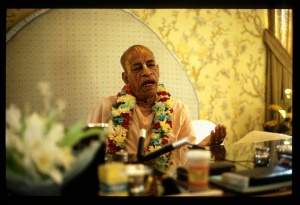SB 10.83.13-14: Difference between revisions
(Vanibot #0018 edit: make synonym terms in Sanskrit italic in SB - Vanisource) |
(Vanibot #0054 edit - transform synonyms into clickable links, which search similar occurrences) |
||
| Line 29: | Line 29: | ||
<div class="synonyms"> | <div class="synonyms"> | ||
''śrī-satyā uvāca'' | ''[//vanipedia.org/wiki/Special:VaniSearch?s=śrī&tab=syno_o&ds=1 śrī]-[//vanipedia.org/wiki/Special:VaniSearch?s=satyā&tab=syno_o&ds=1 satyā] [//vanipedia.org/wiki/Special:VaniSearch?s=uvāca&tab=syno_o&ds=1 uvāca]'' — Śrī Satyā said; ''[//vanipedia.org/wiki/Special:VaniSearch?s=sapta&tab=syno_o&ds=1 sapta]'' — seven; ''[//vanipedia.org/wiki/Special:VaniSearch?s=ukṣaṇaḥ&tab=syno_o&ds=1 ukṣaṇaḥ]'' — bulls; ''[//vanipedia.org/wiki/Special:VaniSearch?s=ati&tab=syno_o&ds=1 ati]'' — great; ''[//vanipedia.org/wiki/Special:VaniSearch?s=bala&tab=syno_o&ds=1 bala]'' — whose strength; ''[//vanipedia.org/wiki/Special:VaniSearch?s=vīrya&tab=syno_o&ds=1 vīrya]'' — and vitality; ''[//vanipedia.org/wiki/Special:VaniSearch?s=su&tab=syno_o&ds=1 su]'' — very; ''[//vanipedia.org/wiki/Special:VaniSearch?s=tīkṣṇa&tab=syno_o&ds=1 tīkṣṇa]'' — sharp; ''[//vanipedia.org/wiki/Special:VaniSearch?s=śṛṅgān&tab=syno_o&ds=1 śṛṅgān]'' — whose horns; ''[//vanipedia.org/wiki/Special:VaniSearch?s=pitrā&tab=syno_o&ds=1 pitrā]'' — by my father; ''[//vanipedia.org/wiki/Special:VaniSearch?s=kṛtān&tab=syno_o&ds=1 kṛtān]'' — made; ''[//vanipedia.org/wiki/Special:VaniSearch?s=kṣitipa&tab=syno_o&ds=1 kṣitipa]'' — of the kings; ''[//vanipedia.org/wiki/Special:VaniSearch?s=vīrya&tab=syno_o&ds=1 vīrya]'' — the prowess; ''[//vanipedia.org/wiki/Special:VaniSearch?s=parīkṣaṇāya&tab=syno_o&ds=1 parīkṣaṇāya]'' — for testing; ''[//vanipedia.org/wiki/Special:VaniSearch?s=tān&tab=syno_o&ds=1 tān]'' — them (the bulls); ''[//vanipedia.org/wiki/Special:VaniSearch?s=vīra&tab=syno_o&ds=1 vīra]'' — of heroes; ''[//vanipedia.org/wiki/Special:VaniSearch?s=durmada&tab=syno_o&ds=1 durmada]'' — the false pride; ''[//vanipedia.org/wiki/Special:VaniSearch?s=hanaḥ&tab=syno_o&ds=1 hanaḥ]'' — who destroyed; ''[//vanipedia.org/wiki/Special:VaniSearch?s=tarasā&tab=syno_o&ds=1 tarasā]'' — quickly; ''[//vanipedia.org/wiki/Special:VaniSearch?s=nigṛhya&tab=syno_o&ds=1 nigṛhya]'' — subduing; ''[//vanipedia.org/wiki/Special:VaniSearch?s=krīḍan&tab=syno_o&ds=1 krīḍan]'' — playing; ''[//vanipedia.org/wiki/Special:VaniSearch?s=babandha&tab=syno_o&ds=1 babandha] [//vanipedia.org/wiki/Special:VaniSearch?s=ha&tab=syno_o&ds=1 ha]'' — He tied up; ''[//vanipedia.org/wiki/Special:VaniSearch?s=yathā&tab=syno_o&ds=1 yathā]'' — as; ''[//vanipedia.org/wiki/Special:VaniSearch?s=śiśavaḥ&tab=syno_o&ds=1 śiśavaḥ]'' — children; ''[//vanipedia.org/wiki/Special:VaniSearch?s=aja&tab=syno_o&ds=1 aja]'' — of goats; ''[//vanipedia.org/wiki/Special:VaniSearch?s=tokān&tab=syno_o&ds=1 tokān]'' — the infants; ''[//vanipedia.org/wiki/Special:VaniSearch?s=yaḥ&tab=syno_o&ds=1 yaḥ]'' — who; ''[//vanipedia.org/wiki/Special:VaniSearch?s=ittham&tab=syno_o&ds=1 ittham]'' — in this manner; ''[//vanipedia.org/wiki/Special:VaniSearch?s=vīrya&tab=syno_o&ds=1 vīrya]'' — heroism; ''[//vanipedia.org/wiki/Special:VaniSearch?s=śulkām&tab=syno_o&ds=1 śulkām]'' — whose price; ''[//vanipedia.org/wiki/Special:VaniSearch?s=mām&tab=syno_o&ds=1 mām]'' — me; ''[//vanipedia.org/wiki/Special:VaniSearch?s=dāsībhiḥ&tab=syno_o&ds=1 dāsībhiḥ]'' — with maidservants; ''[//vanipedia.org/wiki/Special:VaniSearch?s=catuḥ&tab=syno_o&ds=1 catuḥ]-[//vanipedia.org/wiki/Special:VaniSearch?s=aṅgiṇīm&tab=syno_o&ds=1 aṅgiṇīm]'' — protected by an army of four divisions (chariots, horses, elephants and infantry); ''[//vanipedia.org/wiki/Special:VaniSearch?s=pathi&tab=syno_o&ds=1 pathi]'' — along the road; ''[//vanipedia.org/wiki/Special:VaniSearch?s=nirjitya&tab=syno_o&ds=1 nirjitya]'' — defeating; ''[//vanipedia.org/wiki/Special:VaniSearch?s=rājanyān&tab=syno_o&ds=1 rājanyān]'' — the kings; ''[//vanipedia.org/wiki/Special:VaniSearch?s=ninye&tab=syno_o&ds=1 ninye]'' — He took me away; ''[//vanipedia.org/wiki/Special:VaniSearch?s=tat&tab=syno_o&ds=1 tat]'' — to Him; ''[//vanipedia.org/wiki/Special:VaniSearch?s=dāsyam&tab=syno_o&ds=1 dāsyam]'' — servitude; ''[//vanipedia.org/wiki/Special:VaniSearch?s=astu&tab=syno_o&ds=1 astu]'' — may there be; ''[//vanipedia.org/wiki/Special:VaniSearch?s=me&tab=syno_o&ds=1 me]'' — my. | ||
</div> | </div> | ||
Latest revision as of 20:04, 17 February 2024

A.C. Bhaktivedanta Swami Prabhupada
Please note: The synonyms, translation and purport of this verse were composed by disciples of Śrīla Prabhupāda
TEXTS 13-14
- śrī-satyovāca
- saptokṣaṇo 'ti-bala-vīrya-su-tīkṣṇa-śṛṅgān
- pitrā kṛtān kṣitipa-vīrya-parīkṣaṇāya
- tān vīra-durmada-hanas tarasā nigṛhya
- krīḍan babandha ha yathā śiśavo 'ja-tokān
- ya itthaṁ vīrya-śulkāṁ māṁ
- dāsībhiś catur-angiṇīm
- pathi nirjitya rājanyān
- ninye tad-dāsyam astu me
SYNONYMS
śrī-satyā uvāca — Śrī Satyā said; sapta — seven; ukṣaṇaḥ — bulls; ati — great; bala — whose strength; vīrya — and vitality; su — very; tīkṣṇa — sharp; śṛṅgān — whose horns; pitrā — by my father; kṛtān — made; kṣitipa — of the kings; vīrya — the prowess; parīkṣaṇāya — for testing; tān — them (the bulls); vīra — of heroes; durmada — the false pride; hanaḥ — who destroyed; tarasā — quickly; nigṛhya — subduing; krīḍan — playing; babandha ha — He tied up; yathā — as; śiśavaḥ — children; aja — of goats; tokān — the infants; yaḥ — who; ittham — in this manner; vīrya — heroism; śulkām — whose price; mām — me; dāsībhiḥ — with maidservants; catuḥ-aṅgiṇīm — protected by an army of four divisions (chariots, horses, elephants and infantry); pathi — along the road; nirjitya — defeating; rājanyān — the kings; ninye — He took me away; tat — to Him; dāsyam — servitude; astu — may there be; me — my.
Translation and purport composed by disciples of Śrīla Prabhupāda
TRANSLATION
Śrī Satyā said: My father arranged for seven extremely powerful and vigorous bulls with deadly sharp horns to test the prowess of the kings who desired my hand in marriage. Although these bulls destroyed the false pride of many heroes, Lord Kṛṣṇa subdued them effortlessly, tying them up in the same way that children playfully tie up a goat's kids. He thus purchased me with His valor. Then He took me away with my maidservants and a full army of four divisions, defeating all the kings who opposed Him along the road. May I be granted the privilege of serving that Lord.